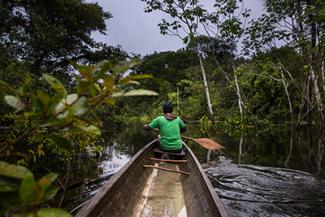Billions of people benefit from wild species every day. According to a 2022 intergovernmental assessment, one in five people on the planet rely on wild plants, algae, and fungi for food, medicine, income, and other purposes. But biodiversity loss, coupled with climate change, threatens to undermine global development progress, making USAID’s work to conserve natural systems and improve the lives of people who depend on them more important than ever.
Through support from Congressional appropriations in FY 2021, USAID worked in more than 60 countries to address the most pressing threats to biodiversity conservation, including those linked to other key sectoral priorities such as climate change, food security, and health. Guided by our Biodiversity Policy, our cross-sectoral programming integrates conservation with other development goals to support the resilience of vulnerable and marginalized communities who depend on biodiversity and healthy ecosystems for food, jobs, and security. USAID recognizes the important role of Indigenous Peoples in biodiversity conservation as stewards of a wide range of critical ecosystems and works to ensure that they benefit from conservation programming and meet their own development objectives.
With deforestation and unsustainable land use driving habitat fragmentation and biodiversity loss, and contributing to nearly one-quarter of global greenhouse gas emissions, USAID’s biodiversity conservation programming helps to fight the climate crisis and build the resilience of people and ecosystems to climate impacts. As USAID Administrator Samantha Power noted, “conserving biodiversity and forests is one of the most important steps we can take to mitigate climate change and biodiversity loss while reducing the risk of disease spillover and potential future pandemics.” USAID, through the its new Climate Strategy and the U.S. government’s Plan to Conserve Global Forests, continues to work toward reversing alarming trends in deforestation by partnering with governments, the private sector, and communities to promote climate-smart agriculture, combat corruption and conservation crimes, and support good governance for the benefit of people and nature.

